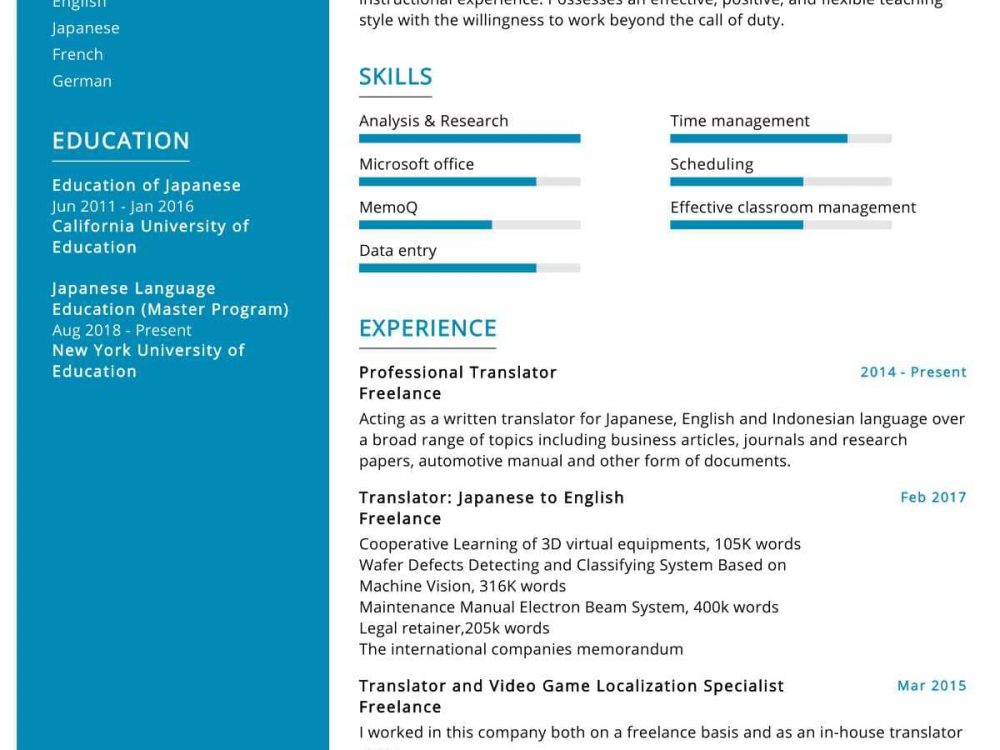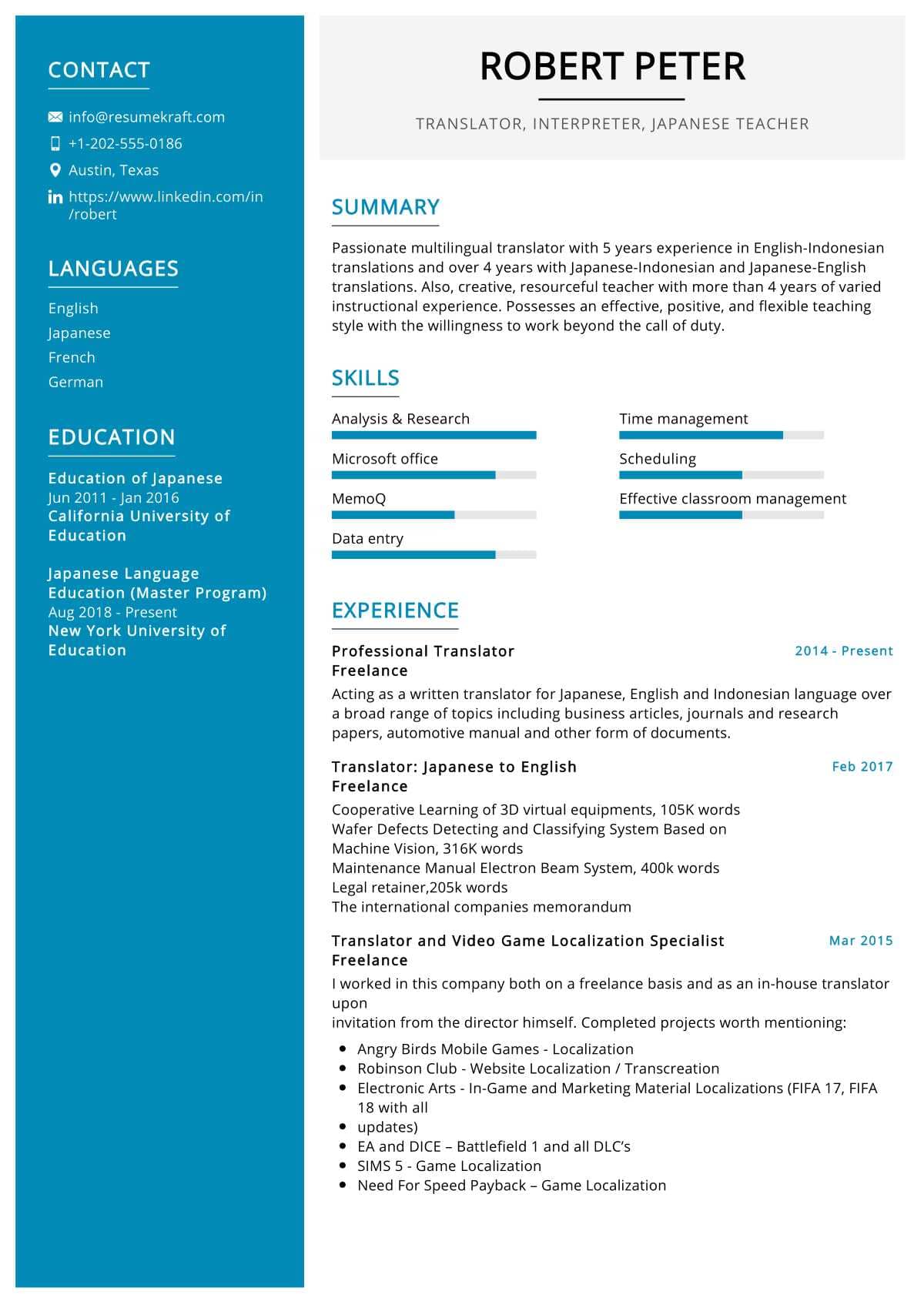Are you a Japanese Translator by profession and looking for an exciting career? We have good news for you! use our professional Japanese Translator/Interpreter Resume Sample. You don’t have to start writing from scratch. Just click “Edit Resume” and modify it with your details. Update the template fonts and colors have the best chance of landing your dream job. Find more resume samples.
Japanese Translator Resume Sample
Robert Peter
Translator, Interpreter, Japanese Teacher
Summary
Passionate multilingual translator with 5 years experience in English-Indonesian translations and over 4 years with Japanese-Indonesian and Japanese-English translations. Also, creative, resourceful teacher with more than 4 years of varied instructional experience. Possesses an effective, positive, and flexible teaching style with the willingness to work beyond the call of duty.
Skills
Work Experience
Professional Translator
Freelance
Acting as a written translator for Japanese, English and Indonesian language over a broad range of topics including business articles, journals and research papers, automotive manual and other form of documents.
Translator: Japanese to English
Freelance
Cooperative Learning of 3D virtual equipments, 105K words
Wafer Defects Detecting and Classifying System Based on
Machine Vision, 316K words
Maintenance Manual Electron Beam System, 400k words
Legal retainer,205k words
The international companies memorandum
Translator and Video Game Localization Specialist
Freelance
I worked in this company both on a freelance basis and as an in-house translator upon
invitation from the director himself. Completed projects worth mentioning:
- Angry Birds Mobile Games – Localization
- Robinson Club – Website Localization / Transcreation
- Electronic Arts – In-Game and Marketing Material Localizations (FIFA 17, FIFA 18 with all
- updates)
- EA and DICE – Battlefield 1 and all DLC’s
- SIMS 5 – Game Localization
- Need For Speed Payback – Game Localization
Education
Education of Japanese
California University of Education
Japanese Language Education (Master Program)
New York University of Education
Languages
- French
- English
- German
- Chines
Career Expert Tips:
- Always make sure you choose the perfect resume format to suit your professional experience.
- Ensure that you know how to write a resume in a way that highlights your competencies.
- Check the expert curated popular good CV and resume examples
Japanese Translator Resume Writing Guide & Tips
If you are into Japanese translation or need a job in the field, your resume must be as polished as possible in order to land the position of your dreams. This article will show you how to write a perfect Japanese translator’s resume, complete with helpful tips on how to make it stand out from other people’s resumes.
Since this is a Japanese translation job, your first impression will come down to how well you can write Japanese. But you do not have to be fluent in the language; you only need to know enough of it to translate correctly. If you have more experience than others applying for the same positions and are willing to put a little extra effort into your resume, your chances are higher of getting an interview. It all depends on how much effort you are willing to put into improving your resume.
Japanese Translator Resume Writing Guide:
- Write your name, contact information and job title at the top of the page. If you don’t know any Japanese, use your full name (or nickname) and a simplified English translation of your job title. Use sentence case as in “Joe Smith is a,” not “is a joe smith.”
- Write some brief professional history at the bottom of the page.
- Use bullet points if you have more than 10 years of professional experience.
- Include a list of your career highlights in the section above your personal information because this is something that potential employers are interested in. Here is an example:
Example Career Highlights: (You can arrange them in any order. Each bullet point should be only one sentence—no more! If you have a lot of bullet points, make two different sections and separate the information by subheadings.)- Translated Japanese documents for several U.S. government departments
- Performed simultaneous translation at international conferences in Japan
- Successfully localized software for an American company operating in Japan
- Highlight your technical skills with phrases like “Advanced Japanese Translation Skills” or “Native Japanese Speaker. “
- Know your country’s name in Japanese. You might not expect to come across this in an interview, but you never know when you might get asked about the country you are from. Don’t be afraid to mention that you were born in Japan or that you live there now. It shows that you have a real interest in the culture, and it also shows that you’re willing to put some extra effort into showing that your resume is unique despite your language skills.
- If you have relevant experience in other languages, it is important to provide that information on your resume as well.
- Put a closing statement on your resume. This helps to show that you have good manners, and it also shows employers that you are confident in your skills and can professionally close off an email, letter, or another form of communication.
List of Typical Responsibilities For a Japanese Translator Resume:
- Japanese to English translation and interpretation
- Preparation of English texts for publication
- Proofreading
- Cultural expertise in the Japanese language, customs, etiquette, etc.
- Writing and editing
- Converting paper texts to digital format
- Preparation of Japanese texts for publication
- Proofreading, editing, and translation assistance
- Writing, editing, and proofreading of marketing materials such as eBooks, etc.
- Translation work for the social media content (e.g. Facebook, Twitter, etc.)
- Translation work for the electronic publishing industry (e.g. ebook and eBook covers)
- Translation of technical/scientific manuals to English
- Data translation between Japanese and English systems
Top 10 Must-have Japanese Translator Skills:
- Excellent written and verbal communication skills in English and Japanese
- Advanced knowledge of the translation process
- Excellent knowledge of both the languages involved (i.e. the source language, Japanese, as well as the target language, English)
- Understanding of grammar rules for both target languages, with emphasis on English grammar rules for translation purposes.
- Experience in the translation industry, translating between Japanese and English including interpreting, writing and translating technical and scientific materials.
- Exceptional attention to detail, a sharp eye for accuracy, thoroughness, and professionalism.
- A strong grasp of the principles of a good translation, such as dictionaries/glossaries or style guides are a plus.
- In-depth knowledge of Japanese etymology, grammar, and modes of expression helps.
- Outstanding written and verbal communication skills in English are required.
- Strong knowledge of how businesses operate within a Western context as well as where cultural differences come into play in translation work are needed.
Tips to write a Japanese Translator Resume Summary:
You should focus on education, key skills, and experience; not hobbies. Make sure you have an eye-catching summary. Also, keep your resume concise by listing only relevant experience. List the companies you worked for and the dates you were employed with them. Make sure to include any significant projects that give you experience in the industry. Edit and proofread your resume before you submit it.
Review your resume with a Japanese recruiter to make sure it reads well in Japanese.
If you have translations or projects you’ve written in a different language, include it on your resume and include a sample of the translation.
List any professional associations that you’re a member of, or have been, and which websites you frequent where you can find foreign clients. Also, list any web pages that give detailed information about your services. For example for writing, display samples of the translatable formats (if applicable) and sample translations.
How to write a Japanese Translator Cover Letter:
- Open with a strong and confident salutation.
- Include 1-2 sentence paragraphs about your experience.
- Use bullet points to list all relevant experience, skills, and tools.
- In the closing paragraph, be sure to include any references you can provide (you do not need references if you are just starting out). If you are more experienced or have something to prove (i.e, if you have completed projects in Japan before), be sure to list any credentials and professional certifications.
- Make sure to use Japanese terms when describing your skills; i.e., “日本語通訳” (Nihongo Tsūyaku — Translator) instead of “Japanese”.
- Since you do not have much space to work within a cover letter, be sure to keep it brief and simple.
- Do not forget to include your name, address, email address, and other contact information!
- Be more direct than indirect when writing your cover letter. [In other words, if you wish to convey that you are a fluent Japanese speaker from Japan (i.e., if you were born in Japan), include those details].
Key Takeaways:
- Don’t use passive voice! Most resume mistakes result from this.
- Use Japanese words and phrases to show your expertise.
- Cite references from other professionals regarding your abilities, not just your experience.
- Never copy an existing resume, always adapt it for your own needs.
To get the highest chance of getting noticed and hired, write a resume that truly highlights your abilities and experience. There are three main things to consider when putting together a resume: personal information, skills and experience, and qualifications/education.


